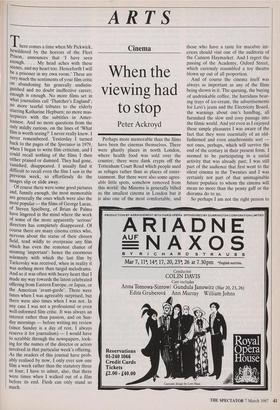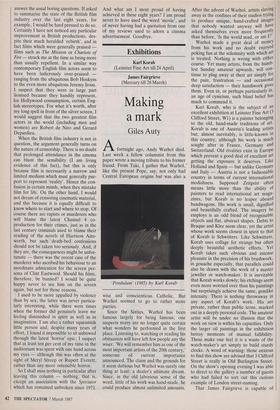ARTS
Cinema
When the viewing had to stop
Peter Ackroyd
There comes a time when Mr Pickwick, bewildered by the horrors of the Fleet Prison, announces that 'I have seen enough. . . . My head aches with these scenes, and my heart too. Henceforth I will be a prisoner in my own room.' These are very much the sentiments of your film critic on abandoning his generally undistin- guished and no doubt ineffective career; enough is enough. No more films set in what journalists call 'Thatcher's England'; no more tearful tributes to the elderly starring Katharine Hepburn; no more mas- terpieces with the subtitles in Amer- icanese. And no more questions from the only mildly curious, on the lines of 'What film is worth seeing?' I never really knew. I never remembered. Yesterday I turned back to the pages of the Spectator in 1979, when I began to write film criticism, and I could recall nothing of the films I then either pfaised or damned. They had gone, vanished, disappeared. I usually find it difficult to recall even the film I saw in the previous week, so effortlessly do the images slip or slide away.
Of course there were some good pictures and, funnily enough, the most memorable are generally the ones which were also the most popular — the films of George Lucas, of Steven Spielberg, of Brian de Palma have lingered in the mind where the work of some of the more apparently 'serious' directors has completely disappeared. Of course there are many cinema critics who, nervous about the status of their chosen field, tend wildly to overpraise any film which has even the remotest chance of seeming 'important': hence the enormous solemnity with which the last film by Tarkovsky was received, when in reality it was nothing more than turgid melodrama. And so it was often with heavy heart that I made my way towards the latest celebrated offering from Eastern Europe, or Japan, or the American 'avant-garde'. There were times when I was agreeably surprised, but there were also times when I was not. In any case I was not a professional or even well-informed film critic. It was always an interest rather than passion, and on Sun- day mornings — before writing my review (since Sunday is a day of rest, I always reserve it for journalism) — I would have to scrabble through the newspapers, look- ing for the names of the director or actors involved in that particular week's offering. As the readers of this journal have prob- ably realised by now, I only ever saw one film a week rather than the statutory three or four; I have to admit, also, that there were times when I walked out of a film before its end. Flesh can only stand so much. Perhaps more memorable than the films have been the cinemas themselves. There were ghastly places in north London, where health food was sold over the counter; there were dank crypts off the Tottenham Court Road which people used as refuges rather than as places of enter- tainment. But there were also some agree- able little spots, somehow removed from this world: the Minema is generally billed as the smallest cinema in London but it is also one of the most comfortable, and those who have a taste for macabre int- eriors should visit one of the auditoria of the Cannon Haymarket. And I regret the passing of the Academy, Oxford Street, which curiously resembled a toy theatre blown up out of all proportion.
And of course the cinema itself was always as important as any of the films being shown in it. The queuing, the buying of undrinkable coffee, the harridans bear- ing trays of ice-cream, the advertisements for Levi's jeans and the Electricity Board, the warnings about one's handbag, all furnished the slow and cosy passage into the filmic world. And yet even as I enjoyed these simple pleasures I was aware of the fact that they were essentially of an old- fashioned and even anachronistic sort not ones, perhaps, which will survive the end of the century in their present form. I seemed to be participating in a social activity that was already past; I was still part of the audience that first went to the silent cinema in the Twenties and I was certainly not part of that unimaginable future populace to whom the cinema will mean no more than the penny gaff or the diorama do to us.
So perhaps I am not the right person to answer the usual boring questions. If asked to summarise the state of the British film industry over the last eight years, for example, I would be hard pressed to do so. Certainly I have not noticed any particular improvement in British productions, des- pite their much heralded 'rebirth', and in fact films which were generally praised films such as The Mission or Chariots of Fire — struck me at the time as being more than usually repellent. In a similar way contemporary English film actors seem to have been ludicrously over-praised ranging from the ubiquitous Bob Hoskyns to the even more ubiquitous Jeremy Irons. I suspect that they were in large part lionised because they handily represent, for Hollywood consumption, certain Eng- lish stereotypes. For what it's worth, after my long spell in front of the silver screen, I would suggest that the two greatest film actors in the world (including men and women) are Robert de Niro and Gerard Depardieu.
When the British film industry is not in question, the argument generally turns on the nature of censorship. There is no doubt that prolonged attendance in the cinema can blunt the sensibility (I am living evidence of this fact), but this is only because film is necessarily a narrow and limited medium which must generally pur- port to represent 'reality'. Hence the con- fusion in certain minds, when they mistake film for life. On the other hand, I would not dream of censoring cinematic material, and this because it is equally difficult to know where to start and where to stop. Of course there are rapists or murderers who will blame the latest Channel 4 co- production for their crimes, just as in the last century criminals used to blame their reading of the novels of Harrison Ains- worth, but such death-bed confessions should not be taken too seriously. And, if they are, the consequences might be unfor- tunate — there was the recent case of the murderer who ascribed his behaviour to an inordinate admiration for the screen per- sona of Clint Eastwood. Should his films, therefore, be banned? I would be quite happy never to see him on the screen again, but not for those reasons.
I used to be more appalled by violence than by sex; the latter was never particu- larly interesting, while there were times when the former did genuinely leave me feeling diminished in spirit as well as in imagination. I am also a rather squeamish little person and, despite many years of effort, I fdund it impossible to sit unbowed through the latest 'horror' epic; I suspect that at least ten per cent of my time in the auditorium was spent with one hand across my eyes — although this was often at the sight of Meryl Streep or Rupert Everett, rather than any more ostensible horror.
So I shall miss nothing in particular after leaving this column — nothing, that is, except an association with the Spectator which has remained unbroken since 1973. And what am I most proud of having achieved in these eight years? I am proud never to have used the word 'movie', and of never having had a quotation from one of my reviews used to adorn a cinema advertisement. Goodbye.



























































 Previous page
Previous page